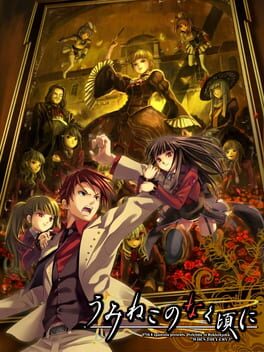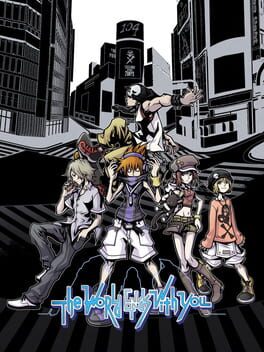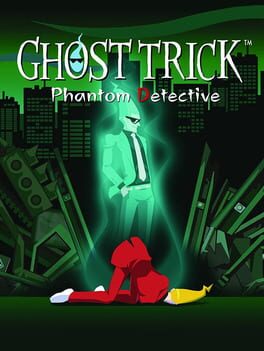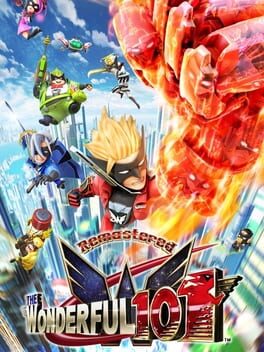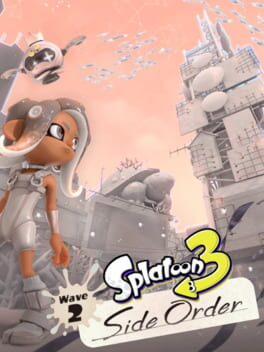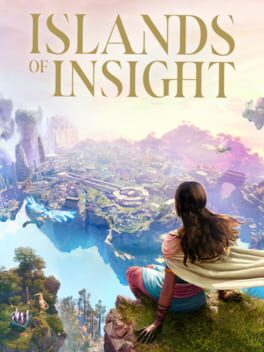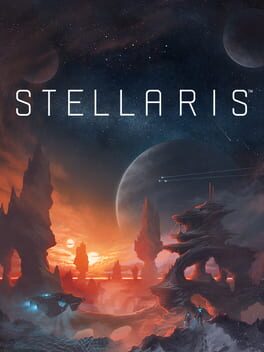SpaceAttorney
Bio
Lab associate somewhere and huge nerd everywhere. On a quest to play EVERY MYSTERY GAME EVER in the hopes of making my own better... eventually.
Lab associate somewhere and huge nerd everywhere. On a quest to play EVERY MYSTERY GAME EVER in the hopes of making my own better... eventually.
Badges

Pinged
Mentioned by another user

GOTY '23
Participated in the 2023 Game of the Year Event

1 Years of Service
Being part of the Backloggd community for 1 year

Noticed
Gained 3+ followers

Gamer
Played 250+ games

Liked
Gained 10+ total review likes

GOTY '22
Participated in the 2022 Game of the Year Event

N00b
Played 100+ games
Favorite Games
282
Total Games Played
000
Played in 2024
016
Games Backloggd
Recently Reviewed See More
In a direct comparison to other roguelites, Side Order comes out looking pretty weak, lacking the variety in levels and modifiers that keeps better entries in the genre feeling fresh right up to the hundred-hour mark. What saves Side Order is that, at the end of the day, it's still Splatoon. And Splatoon is very, very fun to play.
My favorite thing about any of the single-player campaigns in the Splatoon franchise is that they give me the chance to fool around with weapons I would never have given the time of day otherwise. On this axis, Side Order succeeds more than anything before it, as the right combination of color chips can outright invalidate whatever weaknesses a weapon is supposed to have. I wouldn't be caught dead using a charger in multiplayer (well, technically, I would be caught dead - several times), but here I can turn it into a tap-firing homing laser, and there's power in that. In general, I actually quite like the color-chip system: on their face, most of the upgrades aren't very creative (damage, fire rate, ink efficiency, etc.), but the numbers stack to such ridiculous degrees that they end up feeling transformative anyway. Maybe too transformative, at times - the Lucky upgrades pop so often in the late game that you only need one or two before you're drowning in more powerups than you'll ever need.
I hate to say I'm a tad disappointed with the story, though. Splatoon isn't exactly a franchise that needs to be taken seriously, but previous campaigns were worth paying attention to just to see what kind of out-of-pocket madness they'd decided to throw into the mix. Here, we don't really get that - everything's set up by the end of the tutorial, and though you do continue to get new dialogue as you clear the real game multiple times, nothing ever really surprises. That said, as someone who lost in Splatoon 2's final Splatfest, it's nice to see an excuse to have the Order aesthetic brought to life anyway (and, in retrospect, it definitely fits a DLC more than it would have the main hub).
My favorite thing about any of the single-player campaigns in the Splatoon franchise is that they give me the chance to fool around with weapons I would never have given the time of day otherwise. On this axis, Side Order succeeds more than anything before it, as the right combination of color chips can outright invalidate whatever weaknesses a weapon is supposed to have. I wouldn't be caught dead using a charger in multiplayer (well, technically, I would be caught dead - several times), but here I can turn it into a tap-firing homing laser, and there's power in that. In general, I actually quite like the color-chip system: on their face, most of the upgrades aren't very creative (damage, fire rate, ink efficiency, etc.), but the numbers stack to such ridiculous degrees that they end up feeling transformative anyway. Maybe too transformative, at times - the Lucky upgrades pop so often in the late game that you only need one or two before you're drowning in more powerups than you'll ever need.
I hate to say I'm a tad disappointed with the story, though. Splatoon isn't exactly a franchise that needs to be taken seriously, but previous campaigns were worth paying attention to just to see what kind of out-of-pocket madness they'd decided to throw into the mix. Here, we don't really get that - everything's set up by the end of the tutorial, and though you do continue to get new dialogue as you clear the real game multiple times, nothing ever really surprises. That said, as someone who lost in Splatoon 2's final Splatfest, it's nice to see an excuse to have the Order aesthetic brought to life anyway (and, in retrospect, it definitely fits a DLC more than it would have the main hub).
I've seen that Sonic meme about wanting to pay more for smaller games with worse graphics, etc. and I vibe with it as much as the next guy, but it's rare for me to encounter a game that I actually feel like I would have enjoyed substantially more if only substantially less work had gone into it.
Islands of Insight is a game about solving a zillion logic puzzles dotted throughout a number of serene, scenic locales. And that's already a winning formula, as the success of The Witness and The Talos Principle can attest to. That's all I needed. And if that's all there was to Islands of Insight, it would be a reputable entry in the genre. The cornerstone of the game is the Logic Grid, which is a consistently fun time with all the myriad rules that get added, twisted, and blended together over the course of the game. In addition to these are a variety of other puzzle types, which cover pretty broad spectra of difficulty, engagement, and quality. Some, like the classic block-sliding puzzles, are similarly cerebral to the Logic Grids, whereas others, like the hidden objects and perspective-based Skydrops, are tiny little things that you can pop off as you make your way from one major objective to another. Many of the puzzle types didn't vibe with me, like the crystal mazes or the fractal thing, but they're easy to ignore and simple enough to not be frustrating even when mandatory. The only hard stop I encountered was the music grid, which past a certain complexity level just requires a brain function that I don't have (now that I think of it, I think these are what made me drop The Witness too).
But however much joy the simple act of solving puzzles brings, it's marred by the game's greater ambitions. The online aspect is weird, on the face of it - the game seems to have been initially pitched as some kind of puzzle-MMO but player interactivity is heavily limited and the puzzles themselves are all single-player affairs, necessitating the removal of the "online co-op" tag a few days past release. I don't particularly care about any of this, as I was planning to ignore the online aspect completely. But there's one part of it you can't ignore, and that's the server lag. In multiple play sessions I found myself experiencing constant rubber-banding, to the extent that the more movement-centric puzzles became impossible to complete.
Additionally, although there are no microtransactions or anything in the game, there's still this "live-servicey" energy permeating the entire game, where puzzles will routinely appear, disappear, and reset, such that you can never actually completely clear any of the hub areas and instead progress through them by grinding out puzzles over multiple play sessions. This was probably intended to give the game more longevity through more content, but ironically had the opposite effect for me - most puzzles became disposable to me when I realized this, and I would bypass them entirely if they took more than a second or two to solve. This is only true of the hub areas, though - the main progression is done through more classically-designed Enclaves. These are still quite fun, and some of them take advantage of their hand-crafted nature to give the more boring puzzle types like the mazes a unique twist. Maybe it's a blessing in disguise that I learned to ignore the hub areas, since that funneled me towards the best content that much faster.
I didn't engage with the story at all, because the Ubisoft-y dopamine loop of making numbers go up kept me cranking through puzzles at a breakneck pace. However, I think it can be accurately summarized as "if you swallow all the cubes you are legally a master".
Islands of Insight is a game about solving a zillion logic puzzles dotted throughout a number of serene, scenic locales. And that's already a winning formula, as the success of The Witness and The Talos Principle can attest to. That's all I needed. And if that's all there was to Islands of Insight, it would be a reputable entry in the genre. The cornerstone of the game is the Logic Grid, which is a consistently fun time with all the myriad rules that get added, twisted, and blended together over the course of the game. In addition to these are a variety of other puzzle types, which cover pretty broad spectra of difficulty, engagement, and quality. Some, like the classic block-sliding puzzles, are similarly cerebral to the Logic Grids, whereas others, like the hidden objects and perspective-based Skydrops, are tiny little things that you can pop off as you make your way from one major objective to another. Many of the puzzle types didn't vibe with me, like the crystal mazes or the fractal thing, but they're easy to ignore and simple enough to not be frustrating even when mandatory. The only hard stop I encountered was the music grid, which past a certain complexity level just requires a brain function that I don't have (now that I think of it, I think these are what made me drop The Witness too).
But however much joy the simple act of solving puzzles brings, it's marred by the game's greater ambitions. The online aspect is weird, on the face of it - the game seems to have been initially pitched as some kind of puzzle-MMO but player interactivity is heavily limited and the puzzles themselves are all single-player affairs, necessitating the removal of the "online co-op" tag a few days past release. I don't particularly care about any of this, as I was planning to ignore the online aspect completely. But there's one part of it you can't ignore, and that's the server lag. In multiple play sessions I found myself experiencing constant rubber-banding, to the extent that the more movement-centric puzzles became impossible to complete.
Additionally, although there are no microtransactions or anything in the game, there's still this "live-servicey" energy permeating the entire game, where puzzles will routinely appear, disappear, and reset, such that you can never actually completely clear any of the hub areas and instead progress through them by grinding out puzzles over multiple play sessions. This was probably intended to give the game more longevity through more content, but ironically had the opposite effect for me - most puzzles became disposable to me when I realized this, and I would bypass them entirely if they took more than a second or two to solve. This is only true of the hub areas, though - the main progression is done through more classically-designed Enclaves. These are still quite fun, and some of them take advantage of their hand-crafted nature to give the more boring puzzle types like the mazes a unique twist. Maybe it's a blessing in disguise that I learned to ignore the hub areas, since that funneled me towards the best content that much faster.
I didn't engage with the story at all, because the Ubisoft-y dopamine loop of making numbers go up kept me cranking through puzzles at a breakneck pace. However, I think it can be accurately summarized as "if you swallow all the cubes you are legally a master".
